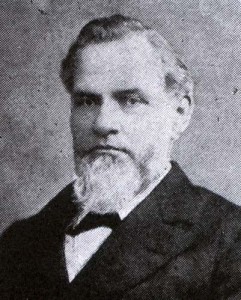Otis Gibson (12/8/1826 – 1/25/1889) was an American missionary to China. On April 3, 1855 Gibson and wife set sail from New York Harbor on a clipper ship bound for Shanghai. In 1856, Otis Gibson and his Methodist co-laborers established two churches in the city, namely, Church of the True God (真神堂) and Church of Heavenly Peace (天安堂), which were the first two Methodist churches built in East Asia.

|
|
After staying in China for ten years, Mr. Gibson returned to the U.S. In his later life, Otis Gibson made untiring and courageous efforts in behalf of the poor and the wronged of the Chinese on the Pacific Coast. In 1877, Mr. Gibosn published his landmark work The Chinese in America (唐人在金山, ISBN 0-405-11272-6). The anti-Chinese sentiment was ramping up across the U.S. at the time, and eventually led to the passing of the Chinese Exclusion Act in 1882. |
Gibson concluded his polemic against the anti-Chinese arguments with a noble restatement of the American ideal:
“The doors of our country are open equally… We have room for all. Ours is the “land of the free, and the home of the brave.” The oppressed and down-trodden from all nations may alike find shelter here, and under the benign influences of our free institutions, and of our exalted faith, with the blessing of Almighty God, these different nationalities and varying civilizations shall, in time, blend into one harmonious whole, illustrating to a wondering world the common Fatherhood of God, and the universal brotherhood of man.”
You can read the the Chinese in America by Otis Gibson. It was digitized by Google Books.
Click to access The_Chinese_in_America.pdf
Introduction by M. C. BRIGGS
I HAVE carefully read in manuscript all the chapters of Rev. O. Gibson’s book entitled, “The Chinese in America,” and am prepared to say that it contains the freshest and most accurate information on the subject, from an American stand-point, which has fallen under my eye. Ten years’ experience in China, and eight in California, devoted wholly to the improvement of the Chinese people, gives the author peculiar qualifications for the work he has so opportunely accomplished. I am inclined to think that he has drawn the faults of the pagan strangers a little more strongly than their virtues; but the book is written in that style of bold frankness and robust honesty, which base and venal functionaries have found to their cost to be characteristic of the author.
The Chinese problem is intrinsically worthy of the study of American citizens. Add to this the factitious consequence which the machinations of demagogues, the fears of the timorous, and the malice of (mostly Papist) competitors in the labor market have given it, and we have ample reason for the publication of such a book as this, by such an author, at such a time. I think I do not overestimate the work when I say that to the permanent value of an authentic history it adds the piquancy of a live discussion of questions of intense present interest. In all its aspects the Chinese problem commands the attention of the thoughtful.
Shall we recede from the fundamental maxims of Manhood Government, dishonor a treaty which we virtually forced upon the Chinese Government for our own advantage, imperil the lives of American citizens in China, destroy a commerce rich in its early fruit and magnificent in its promises of the future, hush our high boast of open doors and unbarred gates, repel labor, which is the only authentic capital, and stifle the dictates of Christian philosophy; all in the interests of sinister jealousy and an irrational alarm ? These are grave questions, and Mr. Gibson’s book will afford invaluable aid in the intelligent consideration of them. They are questions of national breadth, and every man, who wishes to reason like a statesman, and act like a Christian, should hasten to qualify himself to handle them with intelligence and candor.
Men of solid thought and weight of character are proverbially “slow to speak.” The real rulers of this State have not yet been heard on this Chinese question, save in the quiet protests of the counting- room, the farm-house and the kitchen. The madness of the mob is apparently already subsiding, and the emergency may not demand a more pronounced opposition. But let not the people of other States draw hasty inferences from the noise and fury of the Anti-Chinese ebullition. The Chinese are here by the order of Providence, the principles of the Declaration, and the provisions of treaty, and here they are sure to stay till better reasons for their expulsion can be shown than any which have yet appeared.
M. C. BRIGGS
Sacramento, California, Sept. 26, 1876.